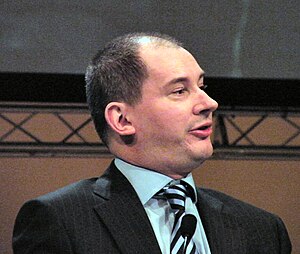| (Photo credit: Wikipedia) |
Bristol West MP Stephen Williams may have fallen into the trap of the pot calling the kettle black.
I refer of course to his remarks in the House of Commons this week - reported in Hansard - in which he raised concerns about the use of the word "gay" in popular youth culture to refer to something "second-rate" or "derisory". In particular, Mr Williams expressed concern at the BBC "allowing leading disc jockeys ... to use the word gay in a pejorative sense."
Perhaps Mr Williams (and Kevin Brennan MP who expressed a shared concern) would benefit from pausing for thought before calling for bans which will not work.
When the word "gay" first started to acquire widespread connotations of homosexuality in the mid-20th century, some objected strongly to this development. Objections to this change were routinely dismissed in the 1960s and 70s as reactionary. Language, it was argued, was always changing and was a vehicle for the self-expression of a community. The rules of language, furthermore, were claimed to be descriptive of how language was actually used, not fixed ordinances stating how it ought to be used. Noam Chomsky was occasionally referred to as providing a theoretical framework for this understanding of the nature of language.
At a more basic level, proponents of the use of the word "gay" to mean homosexual claimed at the time that they were free to use any term they wished to describe themselves and their lifestyle. Evidentially they won the argument and the word evolved in its meaning.
Stephen Williams and others who share his concerns appear not to view language in this way. It appears that they wish to ban the use of the word gay by "disc jockeys" because it conveys a pejorative sense of the word gay to young people. Presumably, however, the same principles of freedom of speech and expression articulated by the older proponents of the word change still apply today.
As language change typically happens from the margins of a society rather than its centre, we ought not to be surprised if we find the new definition for the word "gay" emerging from a group such as children or teens. In fact, the use of the word on Radio One means that it has already passed from being a marginal term to one that is already mainstream. Speaking personally, the children and young people I know have been using the term to mean "rubbish" for at least two or three years.
Faced with this reality - that millions of young people will enter adult life in the coming decade using the word "gay" to mean both "homosexual" as well as "rubbish" - those who wish to restrict the use of the term to the former meaning alone will have to make some choices. One of these three things will definitely happen:
1. Opponents will try unsuccessfully to ban the term from being used to describe something substandard and will fail along the way
2. They will accept that the dual-meaning of the word will be mainstream within a few years and live with that reality
3. They will abandon the term altogether and find another word to describe homosexuality.
Those who are shocked by this latter suggestion illustrate how quickly yesterday's radicals become today's defenders of the status quo.


No comments:
Post a Comment